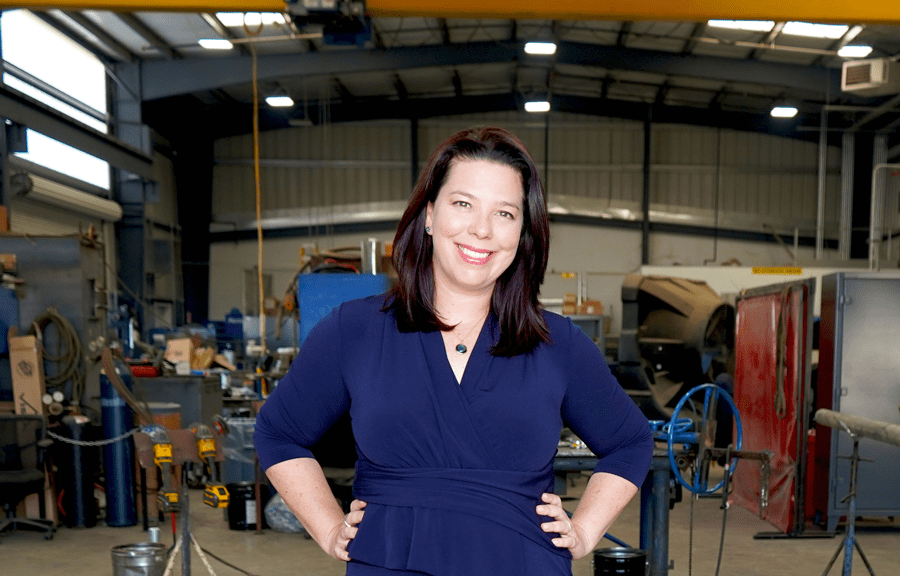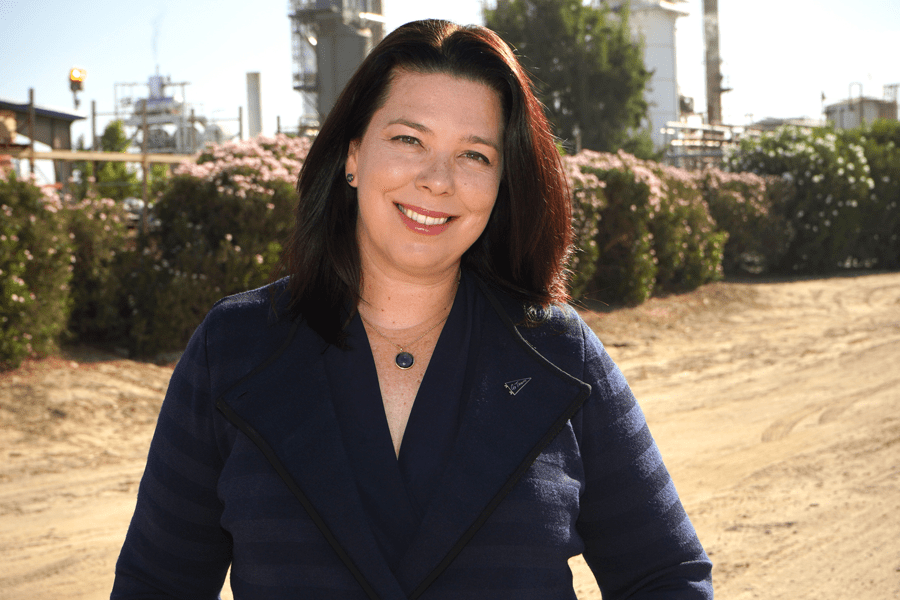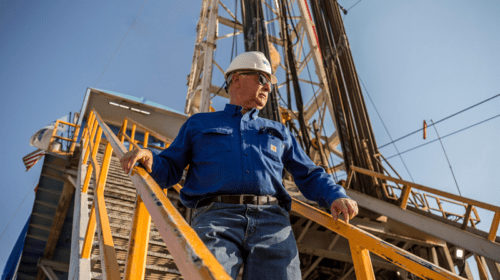Rebecca Ponton: I found it so interesting that when you joined Kern you didn’t have energy industry experience. What attracted you to the refining industry, and Kern in particular?
Jennifer Haley: At my heart and, particularly with my legal background, I like to solve problems. I enjoy challenges. When I joined Kern nearly 12 years ago, there were certainly a lot of challenges and also opportunities to make a real difference. My legal background was putting together a public agency coalition to participate in proceedings before the California Public Utility Commission and also represent water and school districts. They had a lot of challenging circumstances that they were trying to work through and I saw it as analogous to some of the challenges facing the oil industry and the path forward. It’s definitely not a straight line, but it was a new and exciting challenge, and one that I was happy to participate in.
One of the things that was such a blessing is I didn’t have any refining experience and so they literally sent me Petroleum Refining in Nontechnical Language by William Leffler (or as I called it, Refining for Dummies) before I started and I was able to model the adage, “There is no such thing as a dumb question.” There was something very liberating about coming in as this fresh perspective and being able to ask any questions. It shone light on issues that maybe other folks had the same questions about, but were afraid to raise their hand. That experience has really informed my leadership in creating an environment where people feel safe asking the question, being vulnerable, and showing that they don’t know something. Almost every time, there’s somebody else in the room that has the same question.
There’s this idea of a fixed versus growth mindset and embracing that learning and growing every day. That’s a big part of our values here at Kern Energy. It’s very liberating to not be expected to have all the answers. My legal background was instructive because the law is constantly evolving and changing. You think you’ve developed an expertise, and then a case comes out and changes the landscape. That idea that you always had to be on your toes, learning and finding out what the next thing was, was directly applicable to refining and a really exciting thing that I brought to the table at Kern.
Kern has unbelievable longevity and we had an employee – Gwen Hall – who retired last year, who had been with Kern for over 50 years. We have an incredibly loyal, long standing workforce, which is a great advantage; there’s a lot of continuity. People feel good about working here; they want to stay here.
I also think there is a risk in creating an insulated environment where you become a bit of an echo chamber. One of the things that we’ve been deliberate about is making sure that we’re looking outside of our gates at what other people are doing and keeping pace with advancements. A piece of that is recognizing that just because somebody else is doing something doesn’t mean we have to do it, but it’s always better to be educated and informed before you decide.

RP: As you said, you took a non-traditional path to refining and began your career as an attorney. You joined Kern as VP of legal and government affairs. What aspects of your career as a lawyer helped you as you worked your way up the ladder to become CEO and are beneficial even now?
JH: My legal background and education changed the way I view the world. I tend to have a much more risk oriented perspective and also solutions oriented perspective. Part of being a lawyer is recognizing where there might be problems and trying to mitigate those ahead of time; that’s definitely applicable to the work I do. Putting on more of a business hat was a challenge when I initially started working at Kern as general counsel. It was an evolution of “Don’t tell the lawyer,” to “Oh, no, tell the lawyer because she can help us figure it out.” Having more of a collaborative, solutions oriented mindset and not being the “queen of no” was definitely an evolution and an important one.
We look at that across our organization in terms of, “How are you helping the people around you?” A lot of times instead of just saying “no,” it’s “yes, if.” The list of “ifs” might suggest that the answer probably should be “no,” but it shows that you’re actually thinking through how to do what people want to do. Part of that is both hearing what people say they want and trying to understand the reason behind it or the “why,” because oftentimes people get fixated on a particular path when that’s actually not going to achieve what their underlying desire is.
RP: Talk about Kern’s California Clean renewable and refining operations, and whether you think they’re something that could be adopted industry-wide.
JH: When you talk about refining, particularly in California, but in the United States, you’re really talking about some of the most complicated, cleanest and safest commercial operations in the world. When you look back at the history of fuels, Kern’s doors have been open for nearly 90 years and the evolution of the fuels over that time period has just been incredible. We have to appreciate how far we’ve come, and recognize most of that isn’t as visible to the consumer. One example is even though the fuel requirements evolved to require “ultra-low sulfur diesel,” these things are happening behind the scenes. The customer is just going to the pump and getting their gas or diesel, and they don’t realize that things are better than they were a few decades ago.
When I look at Kern Energy, I’m really proud that we are continuing to provide that reliable affordable gasoline and diesel for our community and for our state. We need to recognize that there’s going to be demand for those fuels for decades into the future, and I am concerned about prematurely choking back those fuels before we have the alternatives and enough supply to replace them.
We are embodying an “all of the above approach,” improving what we have while we’re building something new. We are not doing a full scale conversion of our facility. That’s one of the reasons we’re planning to continue shrinking the environmental footprint of our existing conventional fuel operation while we expand on our renewable offerings, including converting our renewable co-processing unit to 100 percent renewable diesel production. We were the second refinery in the United States to get a renewable diesel fuel registration from the EPA back in 2009 and, in August, we hit our fifty millionth gallon of renewable diesel produced. That was before my time with Kern, but I think the company has always been very future focused and wanted to control its own destiny.
Second – second – in the country! For such a small company, we have such an outsized impact and we often say that we’re small but mighty. We embrace it. It’s corny, but true.
When we were facing the Low Carbon Fuel Standard on the California side, and the Renewable Fuel Standard on the federal side, we had the option of buying compliance instruments or blending and producing the renewable fuels to meet the obligation. It would have been a lot cheaper at the time to buy compliance instruments, but Kern made the investment and really wanted to be a participant in that evolution of clean fuels. We are so proud of our innovative attitude and history – and it was not an easy path by any stretch of the imagination – but that is the foundation that we’re building on when we look at investing in next generation renewable fuels and exciting developments around waste to fuel, and really looking at how we continue to have liquid transportation fuels with the lowest carbon intensity possible, and possibly even a negative carbon intensity with some of the advancements.

RP: The leadership team at Kern is evenly divided (three women, three men). Was that a conscious decision on the part of the company or just a happy coincidence? What is the biggest benefit to Kern and to your employees to have that diversity?
JH: The answer is somewhere in between those two positions. It wasn’t like we said we want it to be half and half, and it also isn’t like it was a complete coincidence. One of the perspectives that we try to really emphasize at Kern is diversity – diversity of experiences, perspectives, LGBTQ+, gender, race – across the board. The more perspectives we have, the better results we get.
I am really grateful that I came into my leadership role at a time when we’ve really seen an evolution of leadership across the board, but certainly with women leaders. Historically, in order to be a CEO, a woman had to act like a man. I am incredibly grateful that I had great mentors early on because, when I was initially promoted from general counsel to CEO, I did have this anxiety: Do I need to show up differently and do I need to be more authoritative? Can I not bring my humor into the office?
I had great advice and mentors from the early days that said, “You need to show up as who you are and, if you’re genuine to yourself, that’s going to resonate with the people that you lead.” That’s something that we bring with our values at Kern Energy: We have whole people show up at work. You don’t want people to leave pieces of themselves at home. That makes for a more authentic environment and that leads to a more connected environment. Teamwork is really in the fiber of what we do, and part of that is recognizing our differences, but also how that can bring us together and drive better results.
RP: In May, you attended the Milken Institute’s 25th Global Conference and spoke on a panel as the only woman. First, any thoughts about why conference organizers, in general, don’t put more effort into inviting more female speakers to offer greater diversity of thought and perspective? Also, what, in your opinion, were the most important ideas to come out of the event?
JH: I can’t speak for the conference as a whole and there was a good number of women there; however, our industry is historically male dominated, so when you see people in leadership positions those people tend to be male. I don’t know of another woman CEO of a refinery.
I love that Christina Sistrunk, the former CEO of Aera Energy, and Maryam Brown, who’s the president of SoCalGas, immediately sought me out when I joined the board of the California Chamber of Commerce and have become such good friends. I am really grateful that it feels like we can have that camaraderie, that good old girls’ club – or young girls’ club! Part of that is because we’re at a place where it doesn’t feel like the opportunities are limited. There was a point in time when there was only one spot for a woman on a panel and so you were competing against other women. There was very much a scarcity mindset. Now it feels a lot more like a rising tide lifts all boats and looking for those opportunities to highlight fabulous women in the industry and get them those opportunities.
Our panel at the Milken Institute’s Global Conference was “Planes, Trains and Light Bulbs” and it was talking about the future of energy and the obvious highlight was working in a John Candy quote at the tail end of the panel. There was a lot of industry representation and we tended to agree with each other. I think sometimes it’s figuring out how you can find common ground with folks that don’t have the same perspective as you.
I went to a wonderful dinner that the Brookings Institute put on and they had some scholars who spoke. It’s so important to have academics and scientists in this space talking about if we have these ambitious, clean energy, net zero goals, we have to build stuff in order to achieve those goals. If we can get on the same page and say this is where we want to go, then we need to ask how we get there together, and how do we mobilize existing infrastructure and existing talent toward our goals so that we have an equitable transition, one that lifts up everyone – not just those that can afford it?

RP: What role do you see Kern playing as the industry continues to move forward with the energy transition?
JH: Again, we are embodying an “all of the above approach,” improving what we have while we’re building something new. We are not doing a full scale renewable conversion of our facility. We’re not cannibalizing our conventional fuel facility in order to produce renewables; we’re seeing how we can incorporate renewables, how we can drive down the carbon intensity of our fuels, and innovate and work with new technology providers. We have such incredible longevity and experience in the renewable production space. There are a lot of up and coming folks who don’t have that experience. They have great ideas, but when it comes to the practicality of putting steel on the ground, and actually operating and maintaining units, that’s something that we can bring to the table. I’m really excited about the possibility of collaboration and partnerships where we both bring interesting contributions and can figure out problems together.
We’re in the middle of converting our co-processing unit to produce 100 percent renewable diesel instead of the coprocessing that we had done before. We’re expecting that to be completed before the end of 2023. We are also breaking ground on a new solar project and I believe that we are actually going to be the first refinery in California that’s going to generate Low Carbon Fuel Standard credits from solar generation. It’s an entry point with room for expansion. Then we’re also going after a carbon capture feasibility project funding opportunity with SoCalGas and Sentinel Peak. Those are areas where we don’t have that expertise, but we are happy to work with partners and do what we can to drive that technology forward because we think it’s such an important part of achieving our goals.
A couple weeks ago, I was in the U.K. on an industrial decarbonization delegation that was put on by the U.K. Consulate and it was so fascinating to see what their approach is to achieving carbon neutrality versus ours in the United States. One of their panelists said, “We want to achieve carbon neutrality without exporting jobs and emissions.” How do we achieve that independence and make sure that we’re capable of producing the things that we need? I think energy is a big piece of that puzzle. I’m really proud of the role that we have in moving toward that future in a sustainable way.
About Kern Energy
On October 5, 2022, Kern Oil & Refining Co. announced its rebrand to Kern Energy. The independent, family owned and operated company is powered by a team of 185 employees. As the only refiner between San Francisco and Los Angeles producing clean gasoline and renewable diesel, Kern Energy is a critical supplier of California’s southern San Joaquin Valley. For more information, visit www.kernenergy.com.
Rebecca Ponton is the editor in chief at U.S. Energy Media and author of Breaking the Gas Ceiling: Women in the Offshore Oil and Gas Industry. She is the publisher of Books & Recovery digital magazine.
Oil and gas operations are commonly found in remote locations far from company headquarters. Now, it's possible to monitor pump operations, collate and analyze seismic data, and track employees around the world from almost anywhere. Whether employees are in the office or in the field, the internet and related applications enable a greater multidirectional flow of information – and control – than ever before.










